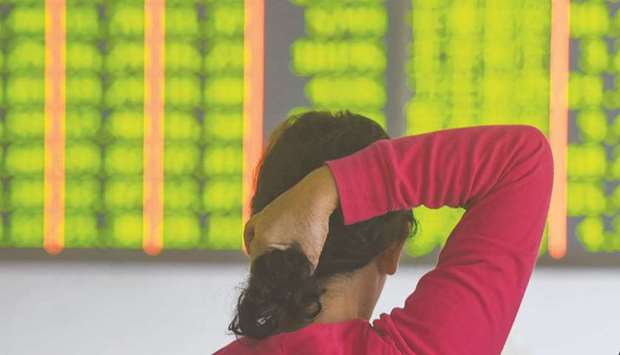Asian markets resumed their downtrend yesterday as investors contemplated more interest rate hikes by the Federal Reserve, while Washington added to China-US frictions and Brexit negotiators struggled to find common ground.
The broad rally across world markets in the middle of the week that was fuelled by upbeat earnings gave way to ongoing uncertainty about the global outlook. Minutes from the Fed’s latest policy meeting showed board members expect to hike borrowing costs as the world’s top economy goes from strength to strength and inflation picks up.
However, some members highlighted the chances of further instability among emerging markets, which have been battered in recent months by a flight of capital to the US and fuelling concerns of contagion that could throw the global economy off track.
The minutes sent the US dollar higher on Wednesday and it held its gains in Asian trade against its peers, while high-yielding and emerging market currencies were deep in the red.
All three main Wall Street indexes ended negative – a day after chalking up their best day in more than six months – with below-par earnings denting sentiment.
And in Asia, Tokyo ended 0.8% lower at 22,658.16, while Seoul fell 0.9% and Singapore shed 0.5%.
Hong Kong, which returned after a one-day break to play catch-up with Wednesday’s rally, was marginally lower at 25,454.55.
Taipei, Manila, Jakarta and Bangkok were also sharply down but Sydney rose 0.1% after data showed unemployment in Australia at its lowest in more than six years. Shanghai dived 2.9 % at 2,486.42, a four-year low as already-strained relations between China and the US took another hit after the White House said it plans to withdraw from an international treaty on postal rates, in a decision aimed at pressuring Beijing.
The move was pushed by top adviser Peter Navarro, according to The New York Times. Navarro has encouraged Donald Trump to crack down on China on a variety of trade and political questions that he has argued disadvantage the US.
The “president has gone postal, escalating US-China tensions and a stronger dollar will pose considerable headwinds to local equity markets,” warned Stephen Innes, head of Asia-Pacific trading at OANDA.
Also Wednesday, Treasury Secretary Steven Mnuchin refused to call China a currency manipulator but raised concerns about the yuan’s fall and Beijing’s exchange practices. “Of particular concern are China’s lack of currency transparency and the recent weakness in its currency,” he said, releasing a twice-yearly report to Congress on how countries manage exchange rates and trade.
The yuan extended losses to sit at 6.9384 per dollar, around its lowest levels since early 2017, with some observers saying the decision not to call out China as a manipulator gave Beijing room to allow for further weakness.
The pound continued to struggle after British Prime Minister Theresa May’s Brexit speech to counterparts at a Brussels summit fell flat, with the two sides at an impasse over the fate of the Irish border.
Antonio Tajani, the president of the European Parliament, said May offered them “nothing substantially new” to discuss when they retired for dinner afterwards without her. However, there was some hope as May considers an offer from EU negotiator Michel Barnier to add a year to the 21-month post Brexit transition period, which would provide more time to hammer out a solution to the border question.
On oil markets, both main contracts dipped after Wednesday’s sharp losses that came on the back of data showing a jump in US stockpiles, which overshadowed the brewing crisis in Saudi Arabia over the disappearance of journalist Jamal Khashoggi.

An investor monitors stock prices at a securities company in Hangzhou, Zhejiang province. Shares in Shanghai exchange plunged 2.9% to 2,486.42 points yesterday as the yuan weakened and the Federal Reserve flagged more US interest rate hikes.


